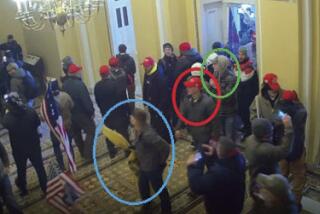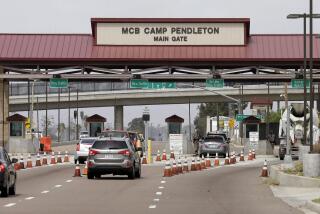Ex-Hostage Says Marine Corps Is Discharging Him
- Share via
A Marine who was among the hostages held for more than a year after Iranians seized the U. S. Embassy in Tehran says he is being discharged from the service because of psychological problems related to the ordeal.
Staff Sgt. John D. McKeel Jr., 35, who now works as a base maintenance man at Camp Pendleton, said Monday that he has largely overcome the problems, diagnosed as post-traumatic stress syndrome, and wants to remain in the Marine Corps. However, he said, he has been informed that he will be released on a disability discharge, possibly by the end of the month.
“I am not saying the Marine Corps in general turned their back on me, but the people I work for turned their back on me,” McKeel said. “In the military, you put your life on the line for your country, and I am prepared to do just that. But, if a veteran has these problems, the government should do more than say, ‘We’ll give you 10%. Goodby.’ If you do rate a disability, the government should try to take care of you.”
Request to Marines Rejected
McKeel, who lives in San Marcos, said he has been classified as 10% disabled and will receive a lump sum of about $20,000 when he is discharged. He said his request to remain in the Marine Corps for four more years, when he will be eligible for normal retirement benefits after 20 years of service, has been turned down and he has agreed to leave without further appeal because he is “tired of fighting.”
Marine Corps spokesmen at Camp Pendleton and in Washington said Monday that no information was available on McKeel’s case because of the Columbus Day holiday.
McKeel was among 42 civilians and 10 Marine embassy guards taken hostage when Iranians stormed the embassy in Tehran on Nov. 3, 1979. They were held hostage for 444 days.
Until the seizure of the embassy, McKeel said, he believed he had a bright future in the military and was among an elite group of Marines chosen to be embassy guards.
However, he began experiencing emotional problems almost from the time he returned to the United States in January, 1981, he said.
“The paper work classified me as a battlefield casualty with post-traumatic stress syndrome,” McKeel said. “I would start crying, I couldn’t sleep, I didn’t eat. Sometimes I couldn’t figure out what was going on.” He said he suffered from frequent bouts of depression and at times would mentally relive the hostage situation.
“I could not sit down and hold a conversation with my wife,” McKeel said. “It had gotten so bad I would not realize where I was.”
McKeel said his emotional difficulties peaked in 1985, when he attended an advanced artillery school at Ft. Sill in Oklahoma, for which he was not adequately prepared. After six weeks, he said, he dropped out of the class, enrolled in a more suitable training course and began to earn outstanding grades.
However, at the time of the final examination, he fell apart, he said. “I went into a depression, not sleeping,” McKeel said. “I didn’t make it to my final exam and they sent me back here to Camp Pendleton.”
McKeel said he has had no emotional problems since he left the training program. “My big problem right now is that I don’t have a job in the military. I’m working as a maintenance man, a janitor, a gardener.
“I don’t recognize or realize that I have caused problems for anyone,” he said. “I have done my job as best I could, yet I am still treated like a typical laborer. I have no responsibilities other than make sure I show up at work and make sure the barracks is clean.”
McKeel attributed his problems in part to envious colleagues who resented the media and public attention he received when he returned from Iran.
“Somewhere along the line, I have made my superiors angry,” he said. “I think a lot of it is jealousy.”
After his return in 1981, McKeel was invited to reign over that year’s Mardi Gras parade in New Orleans and was honored with marching bands and drill teams at a huge homecoming celebration in Balch Springs, Tex., his hometown. Shortly after his return, he told reporters that he had received several death threats from Vietnam veterans who were upset by the attention lavished on the former hostages.
More to Read
Sign up for Essential California
The most important California stories and recommendations in your inbox every morning.
You may occasionally receive promotional content from the Los Angeles Times.













